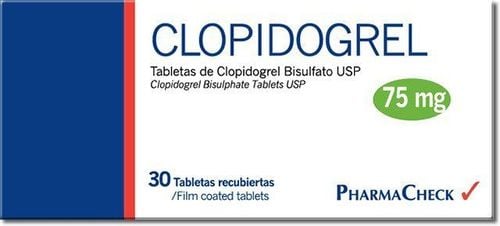This is an automatically translated article.
Clopidogrel is an antiplatelet medication that is used to reduce the risk of heart disease and stroke in people at high risk for these two conditions.1. What does Clopidogrel do?
Clopidogrel is used in adults to prevent thromboembolic disorders such as: myocardial infarction (from a few days to less than 35 days), ischemic stroke (from 7 days) days to less than 6 months) or established peripheral arterial disease.In addition, clopidogrel in combination with aspirin is indicated for patients with acute coronary syndromes without ST-segment elevation, unstable angina, or non-Q-wave myocardial infarction.
2. How to use clopidogrel
Read the product information leaflet provided by your pharmacist before you start taking clopidogrel, to get the most out of it.
Take clopidogrel by mouth, with or without food, usually once a day. To increase adherence, take your medication at the same time each day.
The dose and duration of clopidogrel treatment is based on each patient's medical condition and response to treatment. If you're taking clopidogrel to prevent blood clots after a stent implant or another procedure, take it in combination with aspirin for several months to several years as directed by your doctor.
Consult your doctor for the risks of stopping the medication early. Patients should continue to take clopidogrel, even if they feel well, and should not stop taking it without consulting their doctor.
Avoid eating or drinking grapefruit juice while using clopidogrel, as it can increase the risk of side effects when taken. Patients should ask their doctor or pharmacist for more information.
Inform your doctor immediately if there are any signs that clopidogrel is not working, such as pain in the chest, jaw, left arm; difficulty breathing, unusual sweating; weakness on one side of the body, difficulty speaking; sudden vision changes, confusion...
3. Drug interactions
Drug interactions can change the way clopidogrel works or increase the risk of serious side effects. Therefore, patients need to keep a list of all the products they are using (including prescription drugs, over-the-counter drugs, herbal products) and share it with their doctor or pharmacist for advice. Specifically. Never start, stop or change the dose of any medicine without consulting your doctor. Products that may interact with clopidogrel are: Tipranavir, so the combination should be avoided. If you are taking aspirin, consult your doctor immediately to see if clopidogrel should be continued or discontinued, for the specific condition (aspirin and clopidogrel can be used in combination after the insertion procedure). coronary stents or for certain cardiovascular diseases). If you are not currently taking aspirin, consult your doctor before starting it for any medical condition. Some drugs can affect the elimination (removal) of clopidogrel from the body and reduce the effectiveness of treatment such as: Medicines that reduce stomach acid (proton pump inhibitors - PPIs omeprazole, esomeprazole), fluvoxamine, fluoxetine, cimetidine, fluconazole, ketoconazole, voriconazole, etravirine, felbamate, ticlopidine. If you are taking these medications, consult your doctor/pharmacist before taking clopidogrel. Patients should carefully check all prescription or over-the-counter drug labels to minimize drug interactions when taking.

Thuốc Clopidogrel được sử dụng cho người lớn để ngăn ngừa các rối loạn do tắc nghẽn mạch huyết khối
4. Note about side effects and precautions when using
4.1. Undesirable effects Side effects that may occur when taking clopidogrel include: Easy bleeding, bruising; stomach pain, diarrhea or constipation. If any of these side effects persist or get worse, contact your doctor or pharmacist for specific advice.
Rare side effects that may appear any time from starting clopidogrel include: Severe bleeding in the stomach, intestines, eyes, brain, blood clotting disorders (hemorrhage, thrombocytopenia). thrombosis - TTP)...
Patients should get medical help right away if any very serious side effects appear after taking clopidogrel such as: Severe abdominal pain, uncontrollable bleeding from gums/nose, bloody stools, confusion, fever, pale skin, purple patches of skin, fainting, fast heartbeat, sudden headache, unusual weakness, fatigue, bloody/sebaceous-like vomiting coffee, trouble speaking, vision changes, seizures, yellowing eyes, jaundice, bloody urine (red, pink, dark) or signs of kidney problems (such as change in the amount of urine ).
A very serious allergic reaction to clopidogrel is unlikely, but patients should seek immediate medical attention if they experience one, symptoms include: Rash, itching, and swelling (especially especially face, tongue, throat), severe dizziness, trouble breathing.
The above is not a complete list of all the possible side effects of clopidogrel. If you notice other unwanted effects not listed above, please contact your doctor or pharmacist for specific advice.
4.2. Precautions Before taking clopidogrel, tell your doctor or pharmacist if you have a history of allergic reaction to clopidogrel, similar antiplatelet drugs, or any other medications. This product may contain inactive ingredients and cause allergies or other problems so patients should talk to their pharmacist for more details. Before using clopidogrel, tell your doctor/ pharmacist your medical history, especially of: Bleeding conditions (such as stomach ulcers, bleeding in the brain or eyes), recent surgery, serious injuries serious, liver disease, hemophilia. To reduce your risk of bleeding, bruising, or injury, use caution with sharp objects such as razors and nail clippers, and avoid activities such as contact sports while using clopidogrel. Before surgery, tell your doctor or dentist about all products you are using (including prescription drugs, over-the-counter medicines, and herbal products). Doctors may instruct patients to stop clopidogrel at least 5 days before surgery. Clopidogrel can cause stomach bleeding. Therefore, daily alcohol use while using clopidogrel may increase the risk of stomach bleeding. Patients should limit alcohol and ask their doctor or pharmacist how much alcohol can be safely consumed. During pregnancy, clopidogrel should be used only when clearly needed. Discuss the benefits and risks of using the drug with your doctor. It is not known whether clopidogrel is excreted in human milk. Therefore, patients should consult their doctor before breast-feeding.
Please dial HOTLINE for more information or register for an appointment HERE. Download MyVinmec app to make appointments faster and to manage your bookings easily.
Reference source: Webmd.com












